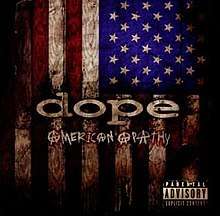American Apathy
American Apathy is the fourth studio album by nu metal band Dope. It was released July 26, 2005, on Artemis Records and managed to sell 9,000 copies in its first week according to Nielsen SoundScan. The album shows the band going back to a more aggressive style of music, incorporating more industrial metal and nu metal elements than on their previous album Group Therapy. The album reached number one on the Billboard Top Heatseekers chart and has sold over 100,000 copies in US.[4]
| American Apathy | ||||
|---|---|---|---|---|
 | ||||
| Studio album by | ||||
| Released | July 26, 2005 | |||
| Genre | ||||
| Length | 48:25 | |||
| Label | Artemis | |||
| Producer | Edsel Dope | |||
| Dope chronology | ||||
| ||||
| Review scores | |
|---|---|
| Source | Rating |
| Allmusic | |
| CDNow | |
| melodic.net | |
| Sputnikmusic | |
Track listing
All tracks by Edsel Dope and Virus except when noted.
- "I'm Back" – 3:25 (Dope)
- "Survive" – 3:12
- "No Way Out" – 3:27
- "Always" – 3:16
- "Bastard" – 3:26
- "Sex Machine" – 2:51 (Dope, Slade)
- "Four More Years" – 0:17
- "Revolution" – 3:39
- "Let's Fuck" – 2:39
- "Fuck the World" – 3:32 (Dope)
- "I Wish I Was the President" – 4:05 (Dope)
- "Dream" – 2:56 (Dope, Milner, Virus)
- "The Life" – 5:08 (Dope)
- "People Are People" (Depeche Mode cover) – 3:12 (Martin Gore)
American Apathy: Reloaded track listing
- "Bitch" (Alternate Version) – 3:06
- "Fuck tha Police" (2005 Studio Version) (N.W.A cover) – 3:48 (Dr. Dre, Ice Cube, MC Ren)
- "Burn" (featuring the Detroit Hate Choir) – 3:16
- "Debonaire" (Fuck Hollywood Mix) – 2:53
- "Now Is the Time" (Alternate Version) – 2:56
- "Motivation" (Alternate Version) – 2:55
- "You Spin Me Round" (American Psycho Mix) (Dead or Alive cover) – 2:44
- "Bring It On" (Fuck Tomorrow Mix) – 3:16
- "Sick" (Bang You're Dead Mix) – 3:41
- Only rare initial pressings of the album included all of these bonus tracks onto the special edition version (which also included a Bonus DVD) of the album giving it a total of 23 tracks.
- In the edited version of the album, the track titles "Let's Fuck", "Fuck the World" and "Fuck tha Police" are changed to "Let's ****", "F.T.W." and "F.T.P." respectively.[1]
Limited edition second disc
- "Debonaire" (Fuck Hollywood Mix)
- "Now Is the Time" (Alternate Version)
- "Motivation" (Alternate Version)
- "You Spin Me Round" (American Psycho Mix)
- "Bring It On" (Fuck Tomorrow Mix)
- "Sick" (Bang You're Dead Mix)
The bonus disc only includes newer pressings of the release.
Personnel
- Edsel Dope – lead vocals, rhythm guitar, bass, keyboards, backing vocals, programming, samples, engineer, producer, mixing
- Virus – lead guitar, bass, keyboards, backing vocals, engineer, vocal producer
- Racci Shay – bass
- Ben Graves – drums
- Detroit Hate Choir – performance
- Chip Quigley – executive producer
- Ted Jensen – mastering
- Stephen Jensen – art conception, art direction, design
- Dan Machnik – photography
- Shawn Nowotnik – assistant
- Ron Ransom – illustrations
- Joey Stumpo – mixing assistant
Chart positions
|
|
|
gollark: They can totally do that.
gollark: It is uploading your SSH key to Microsoft.
gollark: How about a service where people pay you to kill *them*?
gollark: I don't have one either. They are foolish devices.
gollark: Yes.
References
- Allmusic review
- http://www.melodic.net/?page=review&id=3402
- "Dope - American Apathy (Album review ) | Sputnikmusic".
- "Archived copy". Archived from the original on 2015-12-08. Retrieved 2015-03-13.CS1 maint: archived copy as title (link)
- "American Apathy - Dope". Billboard.
This article is issued from Wikipedia. The text is licensed under Creative Commons - Attribution - Sharealike. Additional terms may apply for the media files.